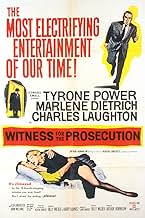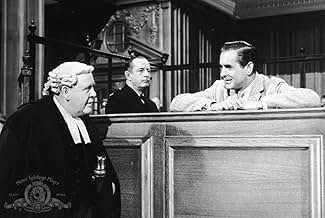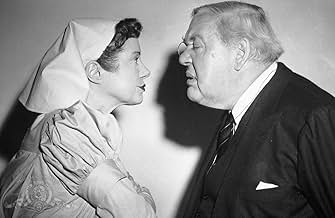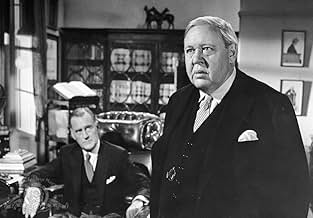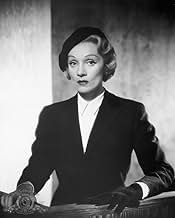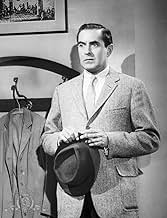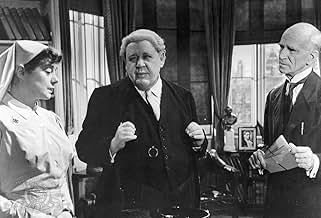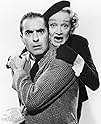A veteran British barrister must defend his client in a murder trial that has surprise after surprise.A veteran British barrister must defend his client in a murder trial that has surprise after surprise.A veteran British barrister must defend his client in a murder trial that has surprise after surprise.
- Nominated for 6 Oscars
- 3 wins & 15 nominations total
Patrick Aherne
- Court Officer
- (uncredited)
Don Ames
- Bar Patron
- (uncredited)
Larry Arnold
- Courtroom Spectator
- (uncredited)
Walter Bacon
- Bar Patron
- (uncredited)
Eddie Baker
- Courtroom Spectator
- (uncredited)
Summary
Reviewers say 'Witness for the Prosecution' is celebrated for its intricate plot, masterful direction by Billy Wilder, and standout performances by Charles Laughton and Marlene Dietrich. The film delves into themes of justice, deception, and complex human relationships within a gripping courtroom drama. Its twisty narrative and surprising ending are often praised for enhancing suspense and entertainment. Despite minor critiques on pacing and some performances, the overall reception is highly positive, marking it as a genre classic.
Featured reviews
At the end of the day the films you give top marks are those films that become constant companions. You can see them again at the drop of a hat, you show them to people who have never see them and it's always a triumph. "Witness For The Prosecution" is one of those wonders. Suspend your disbelief for a couple of hours and enjoy this banquet of a romp. Charles Laughton showed here what he was made of better, more clearly and more loudly than in any other film and all of his films, at least the moments with him in it, are unforgettable - Captain Blight or Henry VIII, Quasimodo or that malefic Senator from South Carolina. Here the severity of his lawyer by vocation takes your senses away with his masterful judicial way to see logic and it's such an incredible fun to watch him do it. Tyrone Power is a toy in his hands but not Marlene Dietrich who stands her ground, not merely as a character but as a presence on the screen. Billy Wilder visits early Hitchcock territory with wit and fun. Elsa Lanchester's nurse is the cherry on top of this delightful film.
In a recent biography of Billy Wilder, Agatha Christie is quoted as saying that this was the best adaption of her work ever done on the screen. I can't praise Witness for the Prosecution any higher than that.
Tyrone Power in his farewell film plays Leonard Vole who befriends a dotty old widow played by Norma Varden. She even rewrites her will leaving him the bulk of a very large estate. When she's murdered, Scotland Yard arrests Power.
Power's solicitor Henry Daniell retains a dream team for defense of John Williams and the recently recovered Charles Laughton. Laughton is recovering from a heart attack and against medical advice plunges into the case. Laughton also has to deal with the efforts of his assigned nurse Elsa Lanchester to keep him following doctor's advice.
The original play this was taken from concentrated completely on the Power character and the machinations of his wife. Wilder built up the character of the nurse and barrister Sir Wilfred Robards so that they almost equaled the screen time of Mr. and Mrs. Vole. So much so that Charles Laughton was nominated for an Academy Award in 1957, but lost to Alec Guinness.
Marlene Dietrich plays Mrs. Vole. She's a war bride over from Germany and she's got her own agenda going. Her performance and what her character does is the key to the whole film. Dietrich probably would have gotten an Oscar nomination herself, but due to the fact that if her performance was hyped up for Academy consideration, the element of surprise would have been lost in the film. Wilder in fact apologized to Marlene for that.
The Anglo-Saxon legal system's goal is justice. Justice is served though not quite in the way it usually is in Witness for the Prosecution.
Tyrone Power in his farewell film plays Leonard Vole who befriends a dotty old widow played by Norma Varden. She even rewrites her will leaving him the bulk of a very large estate. When she's murdered, Scotland Yard arrests Power.
Power's solicitor Henry Daniell retains a dream team for defense of John Williams and the recently recovered Charles Laughton. Laughton is recovering from a heart attack and against medical advice plunges into the case. Laughton also has to deal with the efforts of his assigned nurse Elsa Lanchester to keep him following doctor's advice.
The original play this was taken from concentrated completely on the Power character and the machinations of his wife. Wilder built up the character of the nurse and barrister Sir Wilfred Robards so that they almost equaled the screen time of Mr. and Mrs. Vole. So much so that Charles Laughton was nominated for an Academy Award in 1957, but lost to Alec Guinness.
Marlene Dietrich plays Mrs. Vole. She's a war bride over from Germany and she's got her own agenda going. Her performance and what her character does is the key to the whole film. Dietrich probably would have gotten an Oscar nomination herself, but due to the fact that if her performance was hyped up for Academy consideration, the element of surprise would have been lost in the film. Wilder in fact apologized to Marlene for that.
The Anglo-Saxon legal system's goal is justice. Justice is served though not quite in the way it usually is in Witness for the Prosecution.
I love it when a movie captivates me, carries me along, then surprises me at the end. This is a masterpiece of human maneuvering. It has outstanding acting and a plot to die for. This is a fairly pedestrian Agatha Christie short story. I'm not saying it's not a wonderful story, just that it doesn't come to life like it does on the screen. Charles Laughton is the wonder barrister who is taking the case, even though he is in poor health. The murder case seems a relatively simple one until we begin to trip over the many layers left lying on the path. Marlene Dietrich does a masterful job in all her roles (I won't say anymore than that so I don't spoil the ending). Tyrone Power is able to balance his pathos and his potential guilt. The beauty of the movie is that it never takes itself too seriously. There are some modestly funny subplots and a great deal of careful investigation. I guarantee you that once you start watching, you won't be able to turn it off.
Another brilliant work in the legendary career of Billy Wilder. The director signs a cinematic adaptation of this Agatha Christie story: actually it is really as if the camera went on stage for filming the play. But the film is passionating and exciting, there's no time to get bored.
Another thing we shall not forget is that Billy Wilder is European. He manages to keep the spirit of the film very British, with lots of humour and sarcasm. Compared to films like this one, "legal" movies from John Grisham's novels are empty and meaningless, without soul.
Mr.Wilder is the director, we know; we have Charles Laughton, Tyrone Power and Marlene Dietrich: what a cast! Add a superb black and white cinematography... The result is amazing, with a film where dialogues are flawless and carry everything.
Times are different now, but the atmosphere and the taste of movies like this one are impossible to find in contemporary films.
Another thing we shall not forget is that Billy Wilder is European. He manages to keep the spirit of the film very British, with lots of humour and sarcasm. Compared to films like this one, "legal" movies from John Grisham's novels are empty and meaningless, without soul.
Mr.Wilder is the director, we know; we have Charles Laughton, Tyrone Power and Marlene Dietrich: what a cast! Add a superb black and white cinematography... The result is amazing, with a film where dialogues are flawless and carry everything.
Times are different now, but the atmosphere and the taste of movies like this one are impossible to find in contemporary films.
This is one of the best "trial movies" ever made. It's an outstanding film that is just as good today as it was almost 50 years ago when it was released in the theaters. The shocking ending caused quite a stir back then, too.
The only part of the movie I thought looked dated and unrealistic was Tyrone Power's character being able to interrupt the trial with outbursts and not be reprimanded for it. There is no way that would be tolerated, at least today.
Otherwise, it's a pretty solid film with a good cast that includes two fascinating characters played by actors who know how to entertain: Charles Laughton and Marlene Dietrich.
Laughton, who plays Power's defense attorney, grabs the spotlight in the story but Dietrich almost steals the movie in her role as Power's wife. Laughton's dialog is terrific throughout, bringing a number of laughs to this serious film. He's just a joy to watch. Dietrich is even more riveting but just doesn't have anywhere near the same amount of screen time as Laughton.
Not to be overlooked is Elsa Lanchester, playing Laughton's nurse. She, too, demonstrates her comedic talent and significantly adds to the fun of watching this film.
If you like some fine drama, storyline twists, a little humor thrown in and great acting and dialog, this is a classic film to check out.
The only part of the movie I thought looked dated and unrealistic was Tyrone Power's character being able to interrupt the trial with outbursts and not be reprimanded for it. There is no way that would be tolerated, at least today.
Otherwise, it's a pretty solid film with a good cast that includes two fascinating characters played by actors who know how to entertain: Charles Laughton and Marlene Dietrich.
Laughton, who plays Power's defense attorney, grabs the spotlight in the story but Dietrich almost steals the movie in her role as Power's wife. Laughton's dialog is terrific throughout, bringing a number of laughs to this serious film. He's just a joy to watch. Dietrich is even more riveting but just doesn't have anywhere near the same amount of screen time as Laughton.
Not to be overlooked is Elsa Lanchester, playing Laughton's nurse. She, too, demonstrates her comedic talent and significantly adds to the fun of watching this film.
If you like some fine drama, storyline twists, a little humor thrown in and great acting and dialog, this is a classic film to check out.
Did you know
- TriviaCharles Laughton, who could be moody and difficult, was apparently a dream to work with, throwing himself into the role with dedication and delight. Billy Wilder later recalled a day that was set aside just for shooting reaction shots of the jury and courtroom crowd (composed of extras hired only for the day). Normally, the assistant director would read the actors' lines, and the extras would react. However, Laughton, who was fascinated with the whole process of filmmaking, begged to help. So he came in on his day off and read all of the off-camera speeches to the jury members. He not only read his part but also the judge's, the prosecutor's, and even Marlene Dietrich's. According to biographer Maurice Zolotow in his book "Billy Wilder in Hollywood", "it was an exhibition of craftsmanship such as Wilder had never seen. He believes that Charles Laughton had the greatest technical range and power of any actor, man or woman, whom he has known."
- Goofs(at around 9 mins) Inside his chamber, Sir Wilfrid lights his cigar, and Leonard Vole locks the door to make sure that Miss Plimsoll can't enter the room and catch him smoking. Later (at around 15 mins), Wilfrid leaves his chamber without first unlocking the door.
Actually, Vole does not lock the door, but puts the keyhole cover in place to stop Plimsoll spying through the keyhole.
- Quotes
Sir Wilfrid: I am constantly surprised that women's hats do not provoke more murders.
- Crazy creditsAs the end credits appear on screen, an announcer's voice is heard: "The management of this theater suggests that for the greater entertainment of your friends who have not yet seen the picture you will not divulge to anyone the secret of the ending of Witness for the Prosecution."
- ConnectionsFeatured in Marlene (1984)
- SoundtracksI May Never Go Home Anymore
Music by Ralph Arthur Roberts
Lyrics by Jack Brooks
Sung by Marlene Dietrich (uncredited)
Reprised a cappella by Tyrone Power (uncredited)
Everything New on Prime Video in July
Everything New on Prime Video in July
Your guide to all the new movies and shows streaming on Prime Video in the US this month.
Details
- Release date
- Country of origin
- Languages
- Also known as
- Testigo de cargo
- Filming locations
- Production company
- See more company credits at IMDbPro
Box office
- Budget
- $3,000,000 (estimated)
- Gross worldwide
- $7,903
- Runtime1 hour 56 minutes
- Color
- Aspect ratio
- 1.66 : 1
Contribute to this page
Suggest an edit or add missing content


![Watch Trailer [OV]](https://m.media-amazon.com/images/M/MV5BNTM2MjYzMjAtZjI5MC00YTI1LWI2MzAtMWFlNDc2OTU1MTRiXkEyXkFqcGdeQXRyYW5zY29kZS13b3JrZmxvdw@@._V1_QL75_UX500_CR0)
